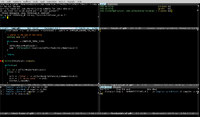Debugging C++
Using gdb to debug lttoolbox/apertium
gdb is the GNU Project debugger, which lets you put breakpoints in C++ (and other languages), inspect local variables and so on. It is useful.
To start using gdb, you first have to recompile with the -g option sent to gcc:
$ sh autogen.sh # ensure autotools are set up $ make clean # force a full recompile # these options turn gdb-support on and optimisation off for C, C++ and linking: $ ./configure CFLAGS="-ggdb3 -O0" CXXFLAGS="-ggdb3 -O0" LDFLAGS="-ggdb3" $ make
Most gdb-tutorials will tell you to start gdb like gdb path/to/binary. However, since apertium/lttoolbox uses libtool, files like trunk/lttoolbox/lttoolbox/lt-comp are actually not binaries, but wrapper scripts which ensure the correct libraries are loaded. Since gdb doesn't understand these wrapper scripts, we need to wrap the gdb call with libtool. If you want to debug lt-comp, you start gdb like this (assuming you are in trunk/lttoolbox):
$ libtool --mode=execute gdb lttoolbox/lt-comp
And it should give you some output and the (gdb) prompt:
Current directory is ~/src/apertium/trunk/lttoolbox/ GNU gdb (GDB) 7.5.1 Copyright (C) 2012 Free Software Foundation, Inc. License GPLv3+: GNU GPL version 3 or later <http://gnu.org/licenses/gpl.html> This is free software: you are free to change and redistribute it. There is NO WARRANTY, to the extent permitted by law. Type "show copying" and "show warranty" for details. This GDB was configured as "x86_64-unknown-linux-gnu". For bug reporting instructions, please see: <http://www.gnu.org/software/gdb/bugs/>... Reading symbols from ~/src/apertium/trunk/lttoolbox/lttoolbox/.libs/lt-lt-comp...done. (gdb)
Now you can pass command-line arguments, set a breakpoint and run the program:
(gdb) set args lr foo.dix foo.bin (gdb) break lt_comp.cc:52 (gdb) run
In Emacs
Do M-x gdb and you'll be asked "Run gdb (like this):", change it to say libtool --mode=execute gdb -i=mi lttoolbox/lt-comp and press return. In the main menu, you can click Gud → GDB-MI and tick off Display Other Windows (or type M-x gdb-many-windows to toggle showing of the breakpoint list, local variables, stacktrace etc.
Valgrind
Valgrind is another debugging tool that lets you profile programs, check for memory leaks, and much much much more.
As with gdb, use the libtool wrapper when running Valgrind:
$ libtool --mode=execute valgrind lttoolbox/lt-comp lr foo.dix foo.bin
